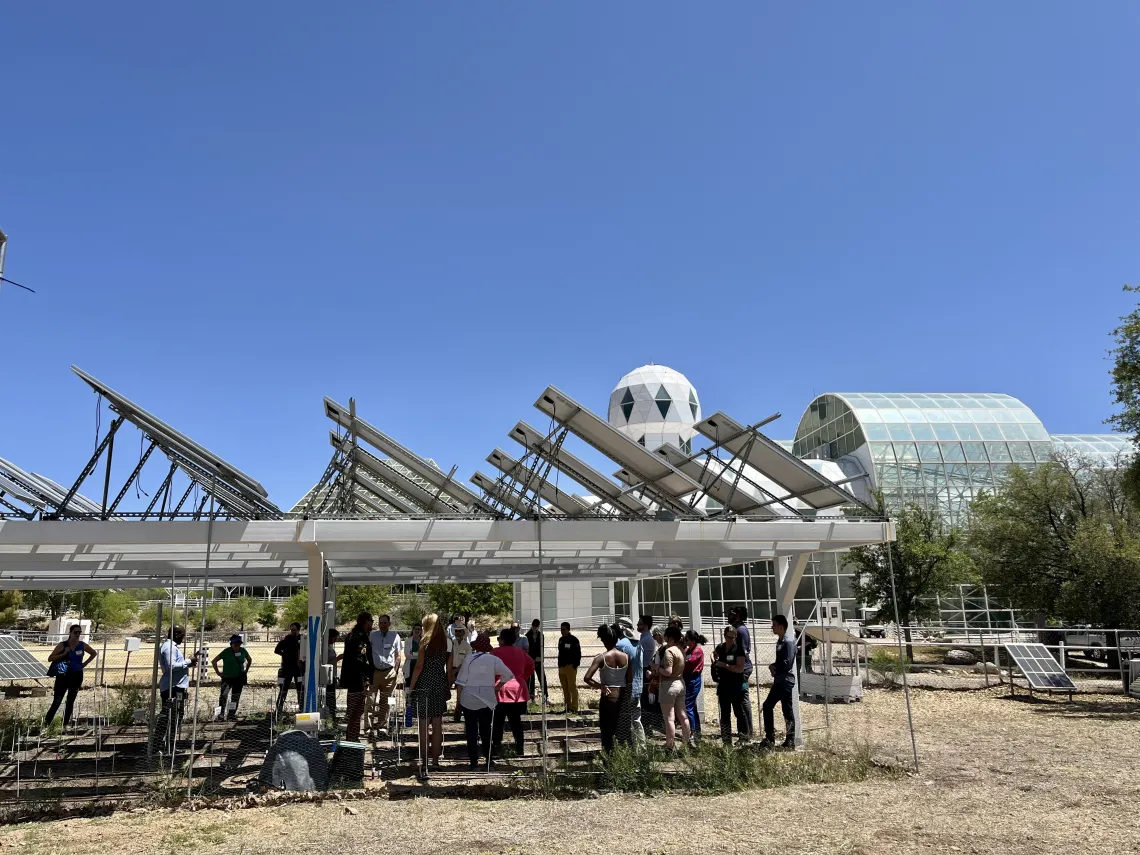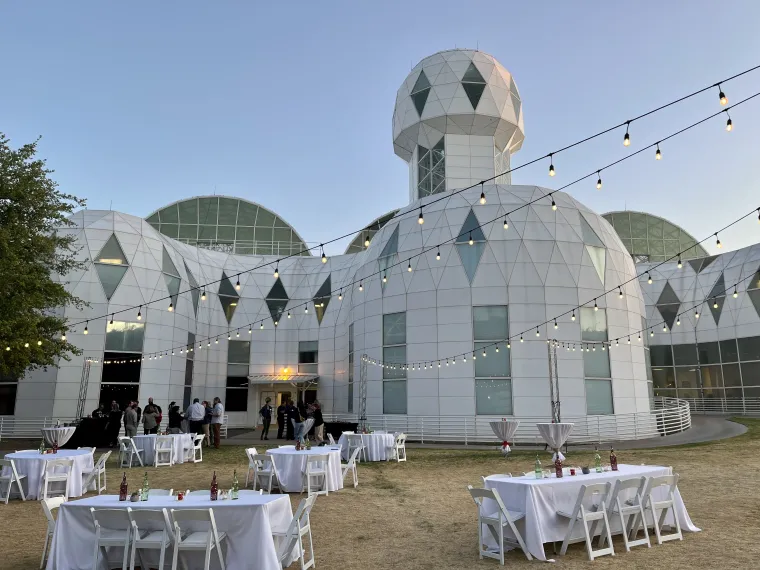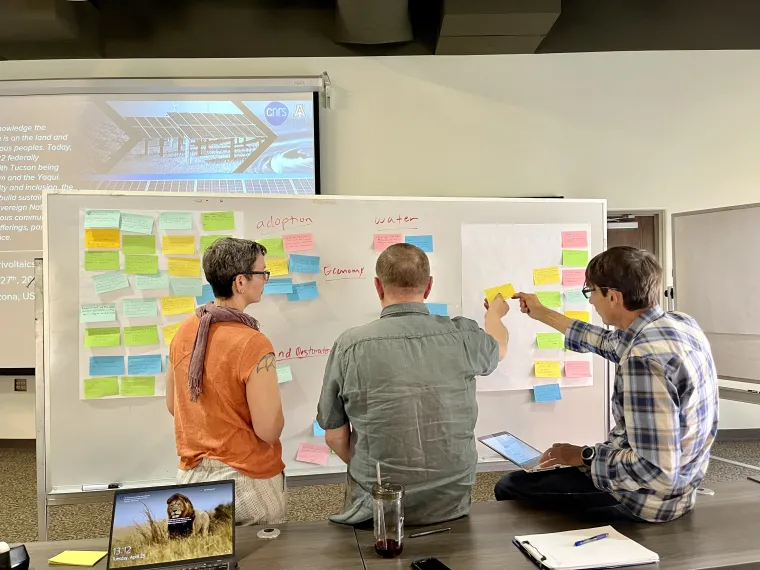Large-scale agrivoltaics, a solution for the sustainable future of food, energy and water
Workshop “Food – Energy – Water Nexus initiative : Agrivoltaics at scale” of the France-Arizona Institute for Global Grand Challenges

Demonstration of the operation of an agrivoltaic system
© Morgane Noel/FA Institute for Global Grand Challenges
In April 2021, the French National Center for Scientific Research (CNRS) and the University of Arizona signed a collaboration agreement establishing the CNRS’s first-ever International Research Center (IRC), the “CNRS-UArizona IRC for Global Grand Challenges”. This institutional arrangement is intended to establish and sustain a strategic dialogue between the two partners, defining their common interests, strengthening current collaborations, and supporting new operations. A major added value of the IRC is its capacity to federate a broad range of partners across academic disciplines and to develop projects of international scope.
The IRC, managed at the University of Arizona by the France-Arizona Institute for Global Grand Challenges, focuses on environmental, space, data, and climate change sciences and strengthens two long-standing pre-existing structures between the University of Arizona and CNRS : the International Research Laboratory Iglobes (Interdisciplinary Global Environmental Studies) and the Human-Environment International Observatory “Pima County”. It also builds on a Joint PhD Program co-financed by both institutions and on a large record of co-publications resulting from a long history of individual collaborations.
In September 2022 the IRC science committee met in Paris and identified three global grand challenges for the partnership to tackle: “Habitability in our future: What Makes A World Fit For Life, and How to Keep it That Way“, “Preparedness to Planetary Challenges: Climate change and Health” and “Integrated Food-Energy-Water Solutions at Scale”. Since then, all three axes are being actively developed. A recent workshop was organized, from April 25 to 27, 2023, at the Biosphere 2 Center of UArizona to address the third one, with a focus on “Agrivoltaics At Scale” as one such integrated solution for a just and secure future of food, energy, and water.

The Biosphere 2 infrastructure, located in Oracle in southern Arizona
© Morgane Noel/FA Institute for Global Grand Challenges
Agrivoltaics refers to the co-location and synergistic association of agriculture with photovoltaic energy production and is defined as “the set of techniques for the protection and agro-climatic regulation of agricultural activities“[1]. This unique combination is of interest to various players in agronomic, social, legal, environmental, and science research, as it makes it possible to reconcile the objectives of agricultural and energetic transition. The installation of photovoltaic modules addresses a double challenge: on the one hand, to contribute to the acceleration of the production of renewable energies with the aim of eventually reaching climate neutrality, and on the other hand, to protect agricultural production from meteorological hazards (excessive sunshine, risk of drought, frost, hail). However, the challenges of the agrivoltaic sector are numerous. For farmers, the acceptability of a project remains conditional on having no negative impact on agricultural production and the income derived from it.
[1] Definition by the French Agency for the Environment and Energy Management (Ademe).

Working group for the formation of themes on the subject of agrivoltaics at scale
© Morgane Noel/FA Institute for Global Grand Challenges
During the Workshop organized through the France-Arizona Institute in charge of the IRC, the question of the development of such an industry was discussed in an interdisciplinary and global approach and with the perspective of deploying agrivoltaic infrastructures at very large scale, on hundreds of thousands of hectares, in various climatic and socio-economic contexts.
The meeting solidified the growing international partnerships with Morocco, Mexico, and Israel, interested in large-scale agrivoltaics. These countries discussed their respective visions of agrivoltaics, the state of research in the field, and their national experimental initiatives. Together with these countries, UArizona and CNRS plan to catalyze new research by funding doctoral research projects that will bring complementary disciplines to work together, from social sciences, law, and economics to ecology, biology, chemistry, physics, and mathematics.
Conference participants focused on three specific objectives: mapping the suitability of agrivoltaic projects based on a large and dynamic range of criteria, studying agrivoltaic systems as subsets of the whole surrounding ecosystem, and the question of project innovation and long-term development for sustainability and resilience. Transverse questions were also raised about the factors that influence the acceptability and adoption of projects, the measures and quantitative monitoring methods to be used, the constraints related to the difficulties and unknowns of implementation (national legal constraints, financing, governance, social justice), and the issues related to the education and training of future users of agrivoltaic technologies.
